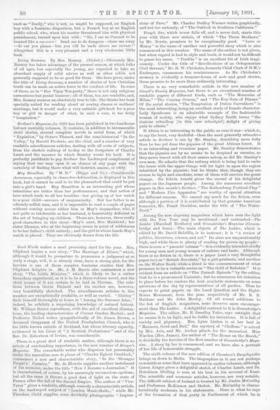Among the new sixpenny magazines which have seen the light
with the New Year may be mentioned—and contrasted—The Ladder (Marshall Brothers) and Groombridge's Magazine (Groom bridgeand Sons).—The main objects of The Ladder, which is edited by Mr, David Balsillie, is to instruct; it is "a review of politics, literature, science, and art." Its aims are unquestionably high, and while there is plenty of reading for grown-up people— there is oven a " parents' column "—it is evidently intended chiefly for young men and young women of culture and taste. Although there is no fiction in it, there is a paper (and a very thoughtful paper too) on " British Novelists," by a girl-graduate, and another• on Sir Walter Scott, while a third is the commencement of what promises to be a valuable series on " The Gold of Rabelais." It is. evident from an article on "The Parnell Episode" by the editor, that he is a pronounced Unionist ; but he announces his intention to place before his readers the best available statements on some questions of the day by representatives of all parties. Thus he expects to print papers on the Land Question and the Eight- Hours Movement, from the pens respectively of Mr. R. B. Haldane and Mr. John Morley. Of all recent additions to the list of English magazines, none deserves more encourage- ment than The Ladder. A delightful contrast to it is Groombridge's Magazine. The editor, Mr. E. Smedley Yates, says outright that he means it to be light, and ho fulfils his intentions. It is full of variety and piquancy. Mrs. Lynn Linton is at her best in "Manners, Good and Bad," the mystery of " Chiffons " is solved
by Mrs. Aria, and Mr. Archer pleads for the unmusical. Miss Warden (Mrs. James), the author of " The House on the Marsh," is decidedly the heroine of the first number of Groombridge's Maga- sine. A story by her is commenced, and wo have also a portrait of her life of honourable struggle.
































 Previous page
Previous page